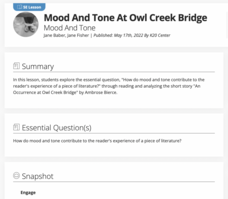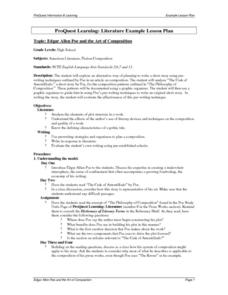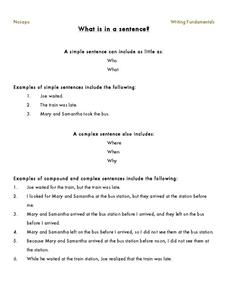Maine Content Literacy Project
Introduction to the Short Story
How should pupils read short stories? Set them up for this unit with an introductory lesson that goes over the main characteristics of a short story and starts learners off reading their first short story of the unit. In order to get a...
Vanier College
Analyzing Short Stories/Novels
Good questions can help focus readers' attention on the elements writers use to add depth to their stories. The questions on this worksheet do just that and encourage readers to think critically about a story and author's purpose.
Maine Content Literacy Project
Introduction to Short Story Writers Say
There are so many authors of short stories, and your class can have the chance to study quite a few. This seventh instructional activity in a series of fourteen continues the decision-making process for the final assessment: a short...
PB Works
The Short Stories of Ernest Hemingway
There is more going on under the surface of Ernest Hemingway's work than one can glean in an initial reading. A literature resource compares the themes and structures of several of Hemingway's works before prompting class members to use...
Southern Nevada Regional Professional Development Program
Reading Literature - An Occurrence at Owl Creek Bridge
“An Occurrence at Owl Creek Bridge,” Ambrose Bierce’s short story, is used to model how structural moves, the decisions an author makes about setting, point of view, time order, etc., can be examined to reveal an author’s purpose. Groups...
K20 LEARN
Freedom And Restraint: Elements Of Fiction
Kate Chopin's short story, "The Story of an Hour" and John H. Young's "Our Deportment, or the Manners, Conduct, and Dress of Refined Society" offer high school juniors an opportunity to compare the role of women in the 19th century with...
Maine Content Literacy Project
Dramatic Structure of the Short Story
The second lesson in a series of fourteen, this plan takes the short story basics a step further. Learners complete a quiz about the story from the previous day, discuss the text, learn about Anton Chekhov, and work in groups to begin...
K20 LEARN
The Anatomy Of A Story: Story Structure
Somebody. Wanted. But. Then. Introduce your classes to the structure that supports stories with a lesson that teaches readers how to identify the four basic components writers use to craft their tales. After identifying these elements in...
Curated OER
Building Fiction: Elements of a Short Story
Students define and interpret the elements found in a short story. Then they identify the elements of plot found in a short story. Students also apply knowledge of plot to an original work of fiction. Finally, they identify the...
Maine Content Literacy Project
Introduction to The Lottery, by Shirley Jackson
"The Lottery" by Shirley Jackson is a great story to share with your class, and this lesson focuses on just that story! The eighth in a fourteen-lesson series on short stories, the plan has learners study some vocabulary, read the story,...
Maine Content Literacy Project
Introduction to John Updike
Expand your pupils' understanding of the short story genre with a study of John Updike and his story "A&P." This lesson plan, the fourth in a series of fourteen, invites learners to examine literary terms and read and discuss the...
K20 LEARN
Mood and Tone at Owl Creek Bridge: Mood and Tone
Two versions of movie trailers for the film Mary Poppins launch a supercalifragilisticexpialidocious lesson about how mood and tone impact a reader's experience of work. Using the provided list, readers identify the words that create the...
Maine Content Literacy Project
The Process of Reading vocabulary, literary elements
Cover Freytag's Triangle and examine Anton Chekhov's "The Bet" in this third lesson plan in a series of fourteen based around short stories. Learners take a quiz and discuss Freytag's triangle. They apply the triangle to "The Bet" and...
Maine Content Literacy Project
Exploring Text with the iMovie Application
Get your class going on one of the final assessments for a unit on short stories by introducing iMovie and its main features. In this tenth lesson in a series of fourteen, pupils take some time to explore iMovie before conducting an...
Maine Content Literacy Project
Introduction to Ernest Hemingway
What is a white elephant, and what does it have to do with Ernest Hemingway? Study "Hills Like White Elephants" in-depth by following the procedures outlined in this instructional activity, the fifth in a series of fourteen. Learners...
Maine Content Literacy Project
Setting in "Hills Like White Elephants"
Continue your study of the short story with the next lesson in this fourteen-lesson series. After wrapping up a study of "Hills Like White Elephants" through a quiz and discussion of the setting, learners are introduced to the final...
Maine Content Literacy Project
Process of Reading
Assist your pupils with literary analysis by discussing and exploring theme. This plan, the twelfth in a series of fourteen, builds in some time to explore theme as a class. Learners also blog about the main event in their stories and...
Art Institute of Chicago
Lesson Plan: A Writer’s Odyssey
Looking for a fresh approach to an end-of-unit project for The Odyssey? Check out a resource that has class members write their own hero's journey short story and then craft an illustration that depicts their tale. Apollonio di...
Curated OER
A Separate Peace: Chapter 11 Reading and Study Guide
To better comprehend the novel, A Separate Peace by John Knowles, learners define 3 vocabulary words, define 1 literary term, and respond to 10 short-answer questions. This resource refers only to Chapter 13 of the book.
Curated OER
Edgar Allen Poe And The Art Of Composition
High schoolers evaluate several works by Edgar Allen Poe based on the criteria in his essay, "The Philosophy of Composotion" Their analysis is documented using a graphic organizer. Learners begin the pre-writing process for their own...
Ohio Department of Education
A Glossary of Literary Terms
If you're tired of defining allusion, onomatopoeia, and satire for your language arts students, hand out a complete list of literary devices to keep the terms straight. Each term includes a definition that is easy to understand and...
Nosapo
What Is in a Sentence, Paragraph, and Story?
Language arts is made up of many parts. Learners review the parts of a sentence, as well as how to make a simple sentence into a complex sentence, before examining full paragraphs and identifying the topic, body, and concluding sentence...
Curated OER
The Rest Cure: Gender in Medicine and Literature
Read and discuss "The Yellow Wall-Paper" and the gender issues that the story brings up. Use articles from the time period to analyze, complete with specific discussion questions. After two days, scholars write an essay based on topics...
Curated OER
Literary Analysis - Young Goodman Brown
Why is literary analysis so important? Readers explore writing a literary analysis by reviewing literary elements such as character, metaphor, plot, setting, simile, personification, and style. They read "Young Goodman Brown" by...

























